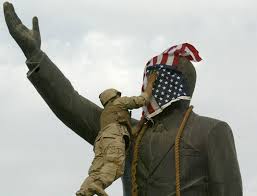What went wrong in Iraq?
Dec 30th, 2008 by MESH
From Daniel Byman
 As the Iraq war moved from crisis to calamity in 2003 and 2004, it became clear to all observers that the occupation was deeply flawed. But what, exactly, was the problem? For many people, particularly in the academic world, the occupation was doomed because the invasion itself was illegitimate and ill-considered and the conditions in Iraq made a successful occupation almost inconceivable. Many of those in the policy world, on the other hand, pointed to a (long) list of policy mistakes that, apart or together, led to the development of an insurgency in Iraq and later a full-blown civil war. All these mistakes, they contend, were avoidable and represented poor judgment rather than problems inherent to occupying Iraq. In short, the development of an insurgency in Iraq represents a classic “structure vs. policy” debate, with both sides pointing the Iraq debacle to bolster their argument.
As the Iraq war moved from crisis to calamity in 2003 and 2004, it became clear to all observers that the occupation was deeply flawed. But what, exactly, was the problem? For many people, particularly in the academic world, the occupation was doomed because the invasion itself was illegitimate and ill-considered and the conditions in Iraq made a successful occupation almost inconceivable. Many of those in the policy world, on the other hand, pointed to a (long) list of policy mistakes that, apart or together, led to the development of an insurgency in Iraq and later a full-blown civil war. All these mistakes, they contend, were avoidable and represented poor judgment rather than problems inherent to occupying Iraq. In short, the development of an insurgency in Iraq represents a classic “structure vs. policy” debate, with both sides pointing the Iraq debacle to bolster their argument.
As someone who wrote in the immediate post-war period on challenges facing the United States in Iraq, I had tried to anticipate many of the problems that coalition forces would face. Although I’m pleased with many of the judgments I made, I clearly missed some problems and underestimated others.
An article I just published in Security Studies tries to get at the interplay between structural and policy issues and explore where things went wrong. As many would argue, several U.S. policy mistakes, in particular the deployment of relatively few troops, a lack of political or military planning for the occupation, disbanding the Iraqi military, the failure to establish a government in waiting, and overly aggressive de-Baathification, greatly exacerbated rather than ameliorated the various structural problems. Yet I contend that some of these mistaken decisions, if not done, would also have produced potentially dangerous results that could have facilitated unrest, albeit from different actors in Iraq who, under the new policy, found themselves losers in the division of spoils.
But more fundamentally, structure and policy choices interacted at all levels to explain the Iraq failure. The unavoidable conditions that coalition forces encountered in Iraq—a divided society devastated by years of war, sanctions, and misrule—and the political context in the United States made the challenge for successful policy execution difficult. This structure constrained and delimited the options open to U.S. policymakers but, even within those narrow limits, the United States made many bad choices that further diminished the chances of success.
A particularly important series of policy mistakes occurred well in advance of the buildup to war itself. The orientation of the U.S. armed forces away from counterinsurgency, the failure to establish a political settlement before invasion, and other controllable policy choices in the prewar period all led to enormous difficulties during the occupation itself. Thus, by the time of the invasion, these policy choices had become almost like structural constraints, and the failures had a snowballing effect, making policy corrections far more difficult.
 Posts+Comments
Posts+Comments Posts+Comments
Posts+Comments Posts+Comments
Posts+Comments Posts+Comments
Posts+Comments